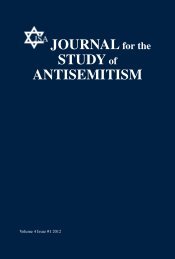JOURNALfor the STUDYof ANTISEMITISM
JOURNALfor the STUDYof ANTISEMITISM
JOURNALfor the STUDYof ANTISEMITISM
Create successful ePaper yourself
Turn your PDF publications into a flip-book with our unique Google optimized e-Paper software.
2011] THE CONVERSOS 133<br />
identify as Jews without <strong>the</strong> conversion requested by rabbinic authorities. In<br />
some communities, Spanish speakers in Mexico and <strong>the</strong> United States have<br />
chosen to identify with Messianic congregations, explaining <strong>the</strong>ir mixture<br />
of Jewish and Christian beliefs and customs as reflecting <strong>the</strong>ir converso<br />
heritage.<br />
CONCLUSION<br />
Recently, Latin American and Hispano-American identity has included<br />
<strong>the</strong> “return” of Judaism. Studies by anthropologists and sociologists preserve<br />
<strong>the</strong> anonymity of <strong>the</strong> statements of <strong>the</strong>ir subjects, so sometimes it is<br />
difficult to assess <strong>the</strong> extent to which <strong>the</strong> attitudes and choices expressed in<br />
<strong>the</strong> studies reflect a small number of respondents or <strong>the</strong> views of a larger<br />
group. But <strong>the</strong>re seems little doubt that many persons of Hispanic background<br />
have been attracted to Jewish beliefs and practices, and in some<br />
cases have undergone formal conversions, in o<strong>the</strong>rs asserting that <strong>the</strong>ir families<br />
have always been Jewish—and thus <strong>the</strong>y identify as Jews and have<br />
adopted lifestyles based on Judaism. Some communities have sought<br />
rabbinic guidance, adopting practices more like those of mainstream Judaism.<br />
O<strong>the</strong>r communities adopted a crypto-Jewish tradition, reflecting primarily<br />
practices reported in <strong>the</strong>se communities, or have asserted an identity<br />
<strong>the</strong>y see as both Jewish and Christian by joining messianic congregations.<br />
In many more cases, <strong>the</strong>re is an openness to <strong>the</strong> element of Jewish and<br />
Islamic heritage among Hispanics, even when this is not <strong>the</strong>ir primary religious<br />
or community identity.<br />
Half a century ago, persons of Hispanic heritage would have argued<br />
that <strong>the</strong> Jewish and Muslim presence on <strong>the</strong> Iberian peninsula was an 800year<br />
aberration. They might have acknowledged some mestizo or European<br />
ancestors but would have made antisemitic statements. Today, it would<br />
seem that many of those with an Hispanic heritage are proud of Jewish<br />
contributions to Spain and value this contribution as part of <strong>the</strong>ir own heritage.<br />
They openly identify <strong>the</strong>mselves as descendants of conversos, in ways<br />
unthinkable a generation or two ago.<br />
*Seth Ward teaches in <strong>the</strong> religious studies at <strong>the</strong> University of Wyoming, Laramie.<br />
He is a research associate of <strong>the</strong> Institute for <strong>the</strong> Study of Israel in <strong>the</strong> Middle East<br />
at <strong>the</strong> Graduate School of International Studies at <strong>the</strong> University of Denver, a Coolidge<br />
Fellow at <strong>the</strong> Association for Religion and Intellectual Life, and vice president<br />
for programs of <strong>the</strong> Society for Crypto Jewish Studies.














